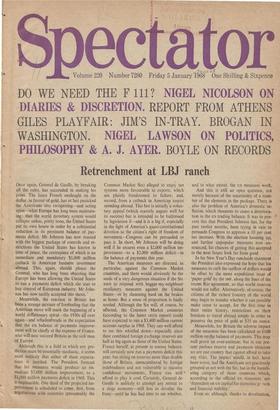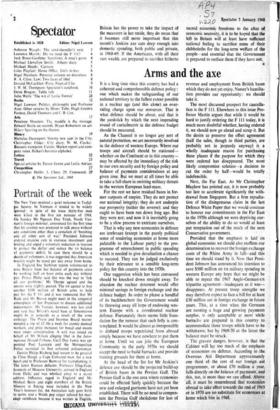Once again, General de Gaulle, by breaking all the rules,
has succeeded in making his point. The latest French onslaught on the dollar, in favour of gold, has at last panicked the Americans into recognising—and acting upon—what Europe has long been maintain- ing : that the world monetary system would collapse unless, pretty soon, the United States put its own house in order by a substantial reduction in its persistent balance of pay- ments deficit. Mr Johnson has now reacted with the biggest package of controls and re- strictions the United States has known in time of peace, the centrepiece of which is an immediate and mandatory $1,000 million cutback in American business investment abroad. This, again, should please the General, who has long been objecting that Europe has been allowing the United States to run a payments deficit which she uses to buy control of European industry. Mr John- son has now tacitly accepted this thesis.'
Meanwhile, the reaction in Britain has been a strange mixture of foreboding that the American move will mark the beginning of a world deflationary spiral—the 1930s all over again—and schadenfreude in the expectation that the us balance of payments improve- ment will be chiefly at the expense of France, who will now succeed Britain as the sick man of Europe. Common Market Six) alleged to enjoy tax systems more favourable to exports, which are plainly foredoomed to failure; and, second, from a cutback in American tourist spending abroad, This last is initially 'a volun- tary appeal (which scarcely augurs well for its success) but is intended to be buttressed by legislation if—and it is a big if, especially in the light of America's quasi-constitutional devotion to the citizen's right of freedom of movement—Congress can be persuaded to pass it. In short, Mr Johnson will be doing well if he secures even a $2,000 million im- provement—to a $2,000 million deficit--in the balance of payments this year.
The American measures are directed, in particular, against the Common Market countries, and there would obviously be the seeds of a very dangerous situation if the Six were to respond with beggar-my-neighbour retaliatory measures against the United States—or by slamming hard on the brakes at home. But a sense of. proportion is badly needed. Although the Six will, of course, be affected, the Common Market countries (according to the latest OECD report) could have expected to run a $3,400 million current account surplus in 1968. They can well afford to see this whittled down—especially since their combined foreign exchange reserves are half as big again as those of the United States. France herself, at present in uneasy balance, will certainly now run a payments deficit this year; but sitting on reserves more than double those of Britain, unencumbered by foreign indebtedness and not vulnerable to massive confidence movements, France can well afford to play it cool. Certainly, General de Gaulle is unlikely to attempt any retreat to a siege economy—still less to devalue the franc—until he has had time to see whether, and to what extent, the us measures work.
And this is still an open question, not merely because of the uncertainty of a num- ber of the elements in the package. There is , also the problem of America's domestic in- flation, which threatens to cause a deteriora- tion in the us trading balance. It was to pre- vent this that President Johnson has, for the past twelve months, been trying in vain to persuade Congress to approve a 10 per cent tax increase. With the election looming up, and further unpopular measures now -an- nounced, his chances of getting this accepted in the near future look far from good.
In his New Year's Day ranchside statement the President also expressed the hope that his measures to curb the outflow of dollars would be offset by the more expeditious issue of `paper gold' by the IMF, along the lines of the recent Rio agreement, so that world reserves would not suffer. Alternatively, of course, the citizens of the richest country of the world may begin to wonder whether it can possibly make sense to accept, for the first time in their entire history, restrictions on ,their freedom to travel abroad simply in order to preserve the price of gold at $35 an ounce. Britain has the power to take the impact of the measures in her stride, they do mean that it becomes still more important that this month's Jenkins axe cuts deep enough into domestic spending, both public and private, in 1968-69. If the Americans, with all their vast wealth, are prepared to sacrifice hitherto sacred economic freedoms to the altar of economic necessity, it is to be hoped that the left in Britain will at least have sufficient national feeling to sacrifice some of their shibboleths for the long-term welfare of the people—and essential that the Government is prepared to outface them if they have not



































